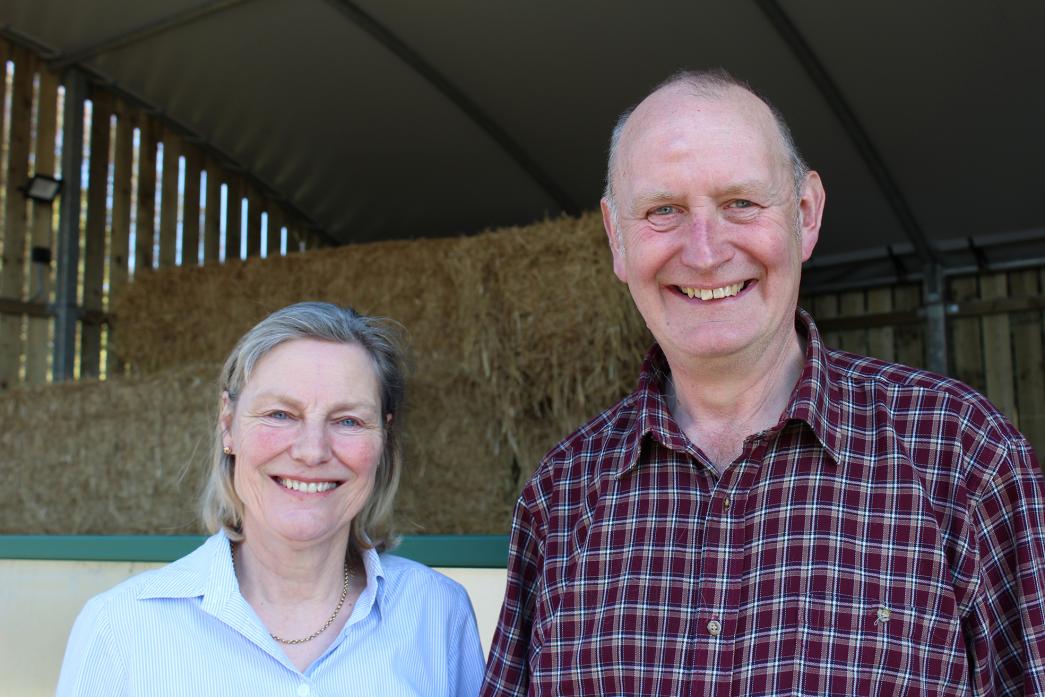
The concept of a financial adviser and a statistician running a farm is definitely worthy of further investigation. Wendy Short set out to discover how Simon and Carolyn Gill are harnessing these skills on their beef and sheep holding on Bowes Moor.
BOWES Cross Farm is set in 30 acres of land, but Simon and Carolyn Gills have bought additional fields since they moved to the holding in 2011.
They now farm about 160 acres, spread over five locations. Some 200 ewes are lambed each year including 40 to 50 pure Beltex; a breed which the couple hold in high regard.
The commercial ewes are mainly Beltex and Texel cross Mule, with a Beltex sire used across the flock.
Lambing takes place in two batches, with the first group lambing in the buildings in early March. Among the later group, the hoggs and ewes with singles and triplets are also lambed inside for ease of mothering on, while those with twins give birth outdoors. Finished lambs are sold at Barnard Castle and Kirkby Stephen auction marts.
Nobody could expect Mr Gill to have a “magic bullet” which will improve the profitability of farming enterprises, and he laments the fact that the price of inputs has risen proportionately higher, compared to the returns on offer for farm produce.
“The cost of concentrate feed has sky-rocketed and the price of straw has been inflated partly because power stations have joined the market looking for a source of fuel,” says Mr Gill. “It is not easy to make money from farming nowadays, but looking after livestock is not just about the money; farming is in my genes, and my wife feels the same way.
“As with any financial enterprise, it is important to measure performance and we have an electronic identification for the sheep, which not only helps with record-keeping, but also allows us to make more informed decisions about which animals to breed from.”
He adds: “We have a very high quality camera set-up in the lambing shed which allows us to monitor the ewes from several points in the house. It has saved us a lot of time and effort this season and the images are so sharp that we can actually see the lambs’ feet when they appear.”
The cattle herd is made up of approximately 35 British Limousin and British Blue suckler cows, all of which are put to a British Limousin bull. The calves are marketed as stores at Barnard Castle Auction Mart. The Gills thoroughly researched the local trade before they chose their breeds of sheep and cattle.
“We went to the markets and made a note of the type of stock that was in the highest demand and which made the best prices,” says Mr Gill.
“Beltex-sired lambs are very popular with buyers and we like the ewes; they are docile, milky and have good maternal qualities. Limousin and Blue calves are also sought-after in this region.”
Simon Gill was brought up on a dairy farm in Northern Ireland. His family moved to North Yorkshire when he was a teenager and so began a career path which intertwined finance management and farming; an unusual combination but one which has given him great satisfaction.
“My father was a doctor and also a farmer, so the idea of having two diverse careers was not unusual to me,” says Mr Gill. “In my case, I always wanted to farm but my head ruled my heart and I ended up following in his footsteps and pursuing a second career. I took a degree in accountancy and moved down to Coventry to work as an accountant.”
But it was not long before Mr Gill’s thoughts turned back to farming and to what he considered his home patch in the north of England. It was at this point that he heard that the owner of what is now Acorn Dairy, at Archdeacon Newton, near Darlington, was looking for a herdsperson.
“Gordon Tweddle had just taken on the tenancy of the farm and I was his first herdsman,” he says.
“After a few years I set up as a self-employed farm worker and found work mainly as a relief milker. This experience taught me that I wanted to farm in my own right and I moved to a small dairy unit near Northallerton, which was part-owned and part-rented.
“Unfortunately, milk quotas were introduced within a short period and that signalled the end of the venture. I decided that it was not the right time for a new entrant to make a living out of dairying that prompted me to take a job as a trainee financial adviser for a merchant bank and eventually to work in an insurance company.”
In 1994, Mr Gill decided that he would set up his own company offering financial advice and Barnard Castle was an obvious choice for its location.
“I have always liked Barnard Castle and a suitable building came up for sale in the town just at the stage when I was looking to establish a base.
“It is a very rural area, which I like, but it has a good road network which offers access to numerous other places.
“At the beginning, about 50 per cent of my customers were farmers, but over the years I added clients who worked in a range of industries and I specialised in providing advice on pensions and investments. Over time, I brought in two directors and we had a couple of full-time staff, but I retired from the business in 2014.”
Mr Gill’s wife, Carolyn, was brought up on a Yorkshire farm and enjoyed a career as a university lecturer in statistics. She takes up the story.
“I was one of two daughters and in those days, there was never a discussion about our taking over the farm because of our gender. The situation might be very different today and I always wanted to farm in my own right,” she says.
“I had given up my career to look after elderly relatives and we were living in Eggleston when a field at Marwood came up for sale and I bought it.
The idea was that we would like to keep some livestock, but after a very short time we felt that it would be much more convenient to have our animals on the doorstep and that led to our move to Bowes Cross.
“It has not really turned out as we had imagined, because so much of the surrounding land is owned by estates, but all of our fields are within a five-mile radius.
“We also have a holiday cottage and some cattle sheds nearby but we are unsure about the property’s future, because it could be affected by the A66 upgrade.”
She adds: “Whatever the case, it is unlikely that the farm will expand in the future, because we do not want to take on more livestock than we can manage by ourselves.”





